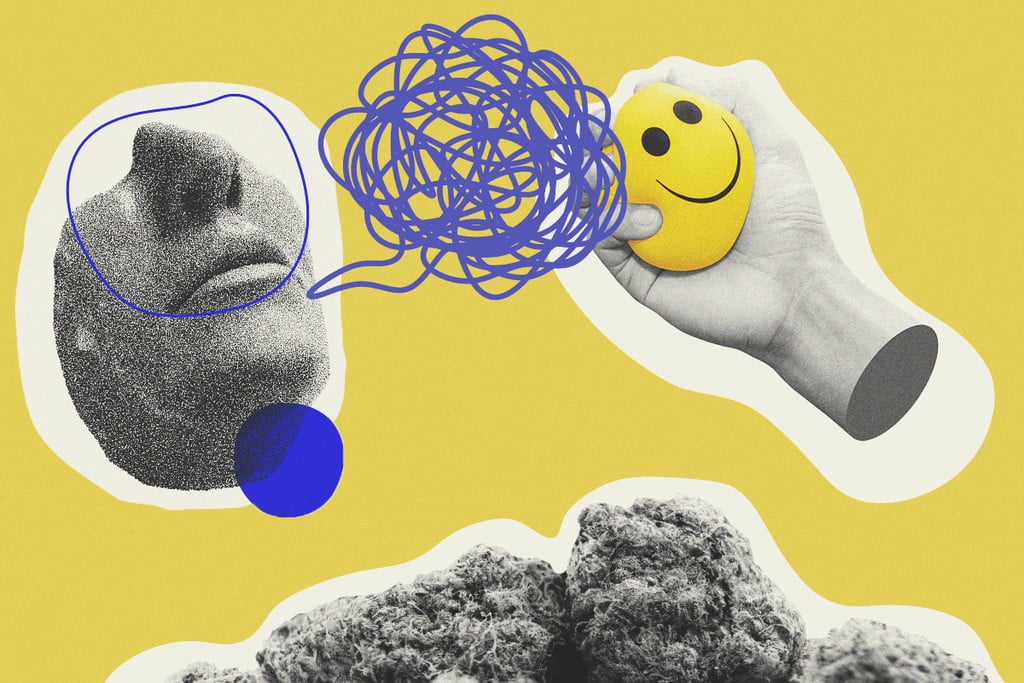.

Cannabis and Anorexia: What We Know So Far
Anorexia affects millions of people internationally. If you've ever experienced the munchies, then it makes logical sense that the herb might help to boost appetite. But it's a lot more complicated than that. While researchers have found a connection between the ECS and appetite and eating behaviours, is weed itself a potential therapeutic tool?
Contents:
How’s your relationship with food? While many of us have no issues consuming three hearty meals each day (and a few snacks in between), others struggle with a range of eating disorders. At least 9%[1] of the global population live with some form of eating disorder, and these conditions are over twice as common in women than in men. Not only does one person die every hour directly from disordered eating, but those living with these conditions experience comorbidities[2] of anxiety, mood disorders, self-harm, and substance use.
Anorexia makes up a large portion of these numbers. The condition stems from a distorted view of one’s own body to the degree that sufferers avoid eating and/or exercise excessively in an attempt to keep losing weight.
As cannabis use continues to boom and ongoing studies keep pitching the herb against myriad conditions, researchers are curious about the relationship between weed and anorexia. Might the plant boost appetite and regulate eating? Or does it contribute to the condition? Discover the relationship between marijuana and anorexia below.
Types of Eating Disorders
There are several types of eating disorders. Whereas some involve the excessive consumption of food over a short period of time, others centre on avoidance of sustenance altogether. The most common forms of eating disorders include:
| Anorexia | Anorexia causes people to avoid food because of a distorted body image. Even those who are underweight still see themselves as overweight, which drives them to limit caloric intake, exercise excessively, and even starve. |
| Bulimia | Whereas anorexia involves self-starvation, people experiencing bulimia consume food and usually have a normal or above-average body weight[3]. The condition involves a cycle of dieting, binge eating, and purging; after consuming large quantities of good, people with bulimia often force themselves to vomit. |
| Binge eating | This eating disorder involves eating large quantities of food over a short window of time. People with the condition often have special “binge foods” and experience feelings of guilt and shame after indulging. |
| Anorexia | Anorexia causes people to avoid food because of a distorted body image. Even those who are underweight still see themselves as overweight, which drives them to limit caloric intake, exercise excessively, and even starve. |
| Bulimia | Whereas anorexia involves self-starvation, people experiencing bulimia consume food and usually have a normal or above-average body weight[3]. The condition involves a cycle of dieting, binge eating, and purging; after consuming large quantities of good, people with bulimia often force themselves to vomit. |
| Binge eating | This eating disorder involves eating large quantities of food over a short window of time. People with the condition often have special “binge foods” and experience feelings of guilt and shame after indulging. |
What Is Anorexia?
Anorexia is both an eating disorder and a serious mental health condition recognised in the Diagnostic and Statistical Manual of Mental Disorders (DSM-5). The condition ranks as the most deadly mental illness, as studies have shown that people with anorexia are 56 times more likely[4] to commit suicide than people living without an eating disorder. By dramatically reducing the intake of calories and nutrients, patients inflict a massive toll on their bodies, which results in a mortality rate of 5–20%. Cutting off these vital supplies leads to bone loss, heart damage, loss of lean muscle mass, infertility, and neurological problems.
-
Causes of Anorexia
The exact causes of eating disorders including anorexia remains unknown. However, it’s likely that a complex set of factors underpins each case. These include:
- Genetic factors that alter hormone levels
- A family history of eating disorders
- Inability to cope with stress
- Excess worry
- Being vulnerable to anxiety and depression
- Compulsive and obsessive behaviour
- Fear of being overweight
- Challenging relationships
- Bullying and abuse


-
Symptoms of Anorexia
As a person restricts energy intake, the body begins to exhibit obvious signs, and the individual may experience the following common symptoms:
- Unusually low body mass index (BMI)
- Bloating and abdominal pain
- Headaches
- Sleeping problems
- Feeling cold and tired
- Dry skin and hair loss
- Loss of periods in women
- Reduced sex drive
Family and close contacts may also notice key signs and changes in the behaviour of the affected person, including:
- Missing meals
- Lying about what they ate
- Avoiding high-calorie foods
- Excessive exercising
Anorexia: The Current Approach
Anorexia has a rather staggering prognosis. Many patients remain emaciated or very thin, and only 50% make a full recovery. But how do they reclaim their health and overcome the mental health struggles associated with the condition? A variety of treatment approaches help patients get to this point, including:
- CBT: Cognitive behavioural therapy helps patients to cope with their feelings and explore the relationship between their thoughts, emotions, and actions. Over time, this approach helps some people with anorexia develop a better relationship with food.
- MANTRA: Maudsley Anorexia Nervosa Treatment for Adults (MANTRA) involves talking sessions with a therapist to identify the underlying causes of the eating disorder. Many patients make good progress over a block of 20 sessions.
- Focal psychodynamic therapy: Provided as a backup when the above forms of therapy fail, this approach guides patients into understanding their eating habits and the thoughts and emotions that surround these choices.
- Nutrition plans: Anorexia patients are given advice on how to eat in a balanced and healthy way. These plans cover the required calories, macronutrients, and micronutrients. They also receive advice on vitamin and mineral supplements when required. However, nutrition plans aren’t enough to help anorexic patients in isolation, and must be delivered alongside some form of therapy.
- Medication: Doctors may prescribe certain medications, such as Prozac, to help patients deal with feelings of anxiety, depression, and social phobia.


Marijuana and Anorexia: How Do They Relate?
Does cannabis deserve a place on the list of treatment options above? What's the relationship between weed and eating disorders?
Several countries across the world have legalized cannabis for a range of issues. Dronabinol, a synthetic version of THC, was approved by the FDA[5] for use in anorexia patients experiencing weight loss associated with acquired immunodeficiency syndrome (AIDS) in the early 1990s.
The issue is that anorexic patients still experience feelings of hunger, but the psychological side of the condition means they simply ignore the impulse. Below, we’ll take a look at research that might offer some clues on the relationship between anorexia and cannabis.
But first, we must review the relationship between the endocannabinoid system and anorexia, as this will provide an understanding of why researchers are interested in cannabis in the first place.
-
What Is the Endocannabinoid System’s Role in Anorexia?
Have you heard of the endocannabinoid system (ECS)? Dr Raphael Mechoulam and other pioneers in cannabis science helped to discover and piece together components of this system decades ago. These findings led researchers to conclude that the ECS plays the role of the “universal regulator” within the human body. This series of signalling molecules (endocannabinoids), receptors, and enzymes is tasked with keeping balance across most bodily systems; these components show up in the bones, skin, brain cells, heart, immune system, and elsewhere.
Interestingly, the ECS also plays a key role when it comes to appetite and metabolism. Far more than a general feeling of hunger, a complex mix of physiological and psychological[6] mechanisms underpin appetite, as well as cravings, food preferences, motivation to eat, and patterns of eating.
The ECS helps to govern homeostasis (biological balance), including energy intake and expenditure. The regulatory network plays a key role in sensations of hunger, and motivates us to find and consume sustenance. If you’ve ever consumed cannabis, you’ll be familiar with the so-called “munchies”. This ravenous hunger sets in because THC binds to the CB1 receptors of the endocannabinoid system.
It just so happens that the human body produces molecules that share a similar structure to THC, which also bind to the CB1 receptor to drive appetite[7].
Ongoing studies are now probing plant-derived cannabinoids as appetite-stimulating agents[8]. These simple compounds may serve as a means of "hacking" the ECS. However, anorexia goes much deeper than appetite. Researchers are still exploring the molecular systems that underpin eating disorders, and how ECS signalling might influence feeding behaviour[9] and the perceived rewarding properties of food.
Researchers are constantly unveiling more ECS components. Whereas two receptors, two endocannabinoids, and several enzymes make up the primary ECS, the "expanded ECS[10]" comprises a host of additional receptors, signalling molecules, and enzymes. Studies have started to explore this system in eating disorders, and scientists recognise it as a key modulatory system in the brain.
Now that you’re aware of the potential role of the ECS in eating disorders and anorexia, let’s take a look at a couple of the main players when it comes to targeting this vast physiological system.


-
The Relationship Between THC and Anorexia
THC underpins the cannabis high. It achieves this by binding directly to CB1 receptors in the brain—the same site that plays a critical role in appetite. Because of this mechanism, researchers have tested the molecule on humans to see if and how it influences appetite and metabolism.
A double-blind placebo-controlled study published in the journal Translational Psychiatry administered smoked, vaporized, ingested, and placebo cannabis to twenty participants. The researchers looked for changes in hormone levels[11] that play important metabolic roles, including ghrelin and insulin.
Another human trial[12], published in the Israel Journal of Psychiatry, administered THC to nine female participants over the age of 18 diagnosed with chronic anorexia. Each subject received 1mg/day for one week and 2mg/day for a further three weeks. Using questionnaires, the researchers gathered subjective data to track improvements in self-reported body care, sense of ineffectiveness, asceticism, and depression.
However, the research remains early and inconclusive. A systematic review[13] published in 2020 collected data from numerous trials that tested THC and dronabinol in the context of anorexia. The authors of the paper concluded that the evidence remains low, but that further research is warranted.
-
What About Cannabidiol (CBD) and Anorexia?
Cannabidiol, known more commonly as CBD, is the second-most abundant cannabinoid in most modern cannabis cultivars. Unlike THC, CBD doesn’t produce a psychotropic effect because it doesn’t bind directly to CB1 receptors.
The cannabinoid has exploded in popularity in recent years due to its lack of mind-altering effects, and hundreds of studies have attempted to identify how the molecule might affect numerous health conditions. Does anorexia autumn into its scope?
Unfortunately, no studies have yet pitched CBD against the eating disorder. However, ongoing trials[14] are administering the cannabinoid to patients experiencing cancer-related anorexia-cachexia syndrome, a debilitating condition that results in weight loss and muscle wasting at the hands of malignant tumours.
Although research is lacking, human studies have previously approved THC and dronabinol for use in certain patients with anorexia. It seems likely that we’ll see more trials using CBD in this context soon. One such example includes an ongoing investigation[15] looking at the effects of CBD on mealtime anxiety in patients with anorexia.


Can Weed Cause Eating Disorders Like Anorexia?
Very little research has linked the plant to causing or triggering the condition. One case study[16], published in 2013, detailed a patient with anorexia that also consumed cannabis for a period of three years. However, the authors state that no similar cases had been reported up until that point, and that such comorbidity remains rare.
How Marijuana and CBD Are Consumed
Cannabis users have several options when it comes to using high-THC marijuana and CBD products. Some like to inhale, whereas others prefer to eat infused foods. The most popular routes of administration include:
- Smoking: Many users prefer to smoke joints, blunts, pipes, and bongs. This method offers a fast onset of effects but comes with obvious health risks.
- Vaping: This technique uses lower temperatures to vaporize cannabinoids and terpenes without combusting the plant material. It produces fewer toxic byproducts but still has some associated health risks.
- Oral: Eating or drinking cannabis-infused products sends cannabinoids through the digestive system. This means they take longer to take effect. In regard to THC, the liver converts it into a more potent molecule that produces an intense psychoactive effect.
- Sublingual: Placing oils and extracts directly under the tongue allows cannabinoids to diffuse through a thin tissue layer directly into the blood, resulting in a rapid onset with no inhalation involved.
-
Side Effects of THC and CBD
Despite the popularity of the above methods, there’s still a lack of data when it comes to bioavailability and dosing recommendations. Both THC and CBD also pose unique side effects, as detailed below.
| Increase heart rate | Coordination problems | Dry mouth | Red eyes |
| Memory loss | Panic | Anxiety |
| Increase heart rate | Coordination problems | ||||||
| Dry mouth | Red eyes | ||||||
| Memory loss | Panic | ||||||
| Anxiety | |||||||
|---|---|---|---|---|---|---|---|
| Dry mouth | Fatigue | Reduced appetite |
| Drowsiness | Upset stomach | Interacts with many prescription medications |
| Dry mouth | Fatigue |
| Reduced appetite | Drowsiness |
| Upset stomach | Interacts with many prescription medications |
Legality of Cannabis
Cannabis remains illegal in many areas of the world. Although some US states and European nations now have medical cannabis programmes, with some even allowing recreational use, countries such as the UK, Norway, Sweden, France, and many African and Asian countries have strict policies against recreational cannabis. However, CBD remains legal for holistic and recreational use in many nations.
Currently, doctors in legal states in the US are able to prescribe marijuana for reduced appetite[17] and weight loss associated with HIV and nerve pain. However, anorexia seems to autumn into a grey area, partly because of the complex nature of the condition and the lack of clinical data.
Cannabis and Anorexia: Not Enough Data
The relationship between cannabis and anorexia remains murky. There’s simply not enough solid data to prove the herb addresses appetite, the desire to eat, and the underlying psychological causes of the eating disorder. However, the critical importance of the ECS in regulating appetite and eating behaviours makes it a promising therapeutic target, and cannabinoids are one of the most powerful ways to influence this system.
Although studies have successfully tested oral, vaporized, and smoked cannabis in human trials, we need to wait on further studies with larger sample sizes before we find out the true relationship between weed and eating disorders.
- Eating Disorder Statistics https://anad.org
- Epidemiology of eating disorders in Europe: prevalence, incidence, comorbidity, course, consequences, and risk factors https://pubmed.ncbi.nlm.nih.gov
- Frequently Asked Questions About Eating Disorders https://www.hopkinsmedicine.org
- Eating disorder statistics 2022 https://www.singlecare.com
- Dronabinol Approved for Use in Anorexia Associated With Weight Loss in Patients with AIDS https://jamanetwork.com
- Mechanisms of appetite control and their abnormalities in obese patients https://pubmed.ncbi.nlm.nih.gov
- Endocannabinoids in the regulation of appetite and body weight https://pubmed.ncbi.nlm.nih.gov
- Approved cannabinoids for medical purposes https://www.sciencedirect.com
- The role of the endocannabinoid system in eating disorders: pharmacological implications https://pubmed.ncbi.nlm.nih.gov
- Changes in the Peripheral Endocannabinoid System as a Risk Factor for the Development of Eating Disorders https://pubmed.ncbi.nlm.nih.gov
- Effects of oral, smoked, and vaporized cannabis on endocrine pathways related to appetite and metabolism: a randomized, double-blind, placebo-controlled, human laboratory study https://www.nature.com
- The Impact of Δ9-THC on the Psychological Symptoms of Anorexia Nervosa: A Pilot Study https://pubmed.ncbi.nlm.nih.gov
- Treatment studies with cannabinoids in anorexia nervosa: a systematic review https://link.springer.com
- Comparison of Orally Administered Cannabis Extract and Delta-9-Tetrahydrocannabinol in Treating Patients With Cancer-Related Anorexia-Cachexia Syndrome https://ascopubs.org
- Role of CBD in Regulating Meal Time Anxiety in Anorexia Nervosa https://clinicaltrials.gov
- Anorexia Nervosa and Cannabis Abuse: A Case Report https://www.tandfonline.com
- Medical Marijuana https://www.webmd.com






































